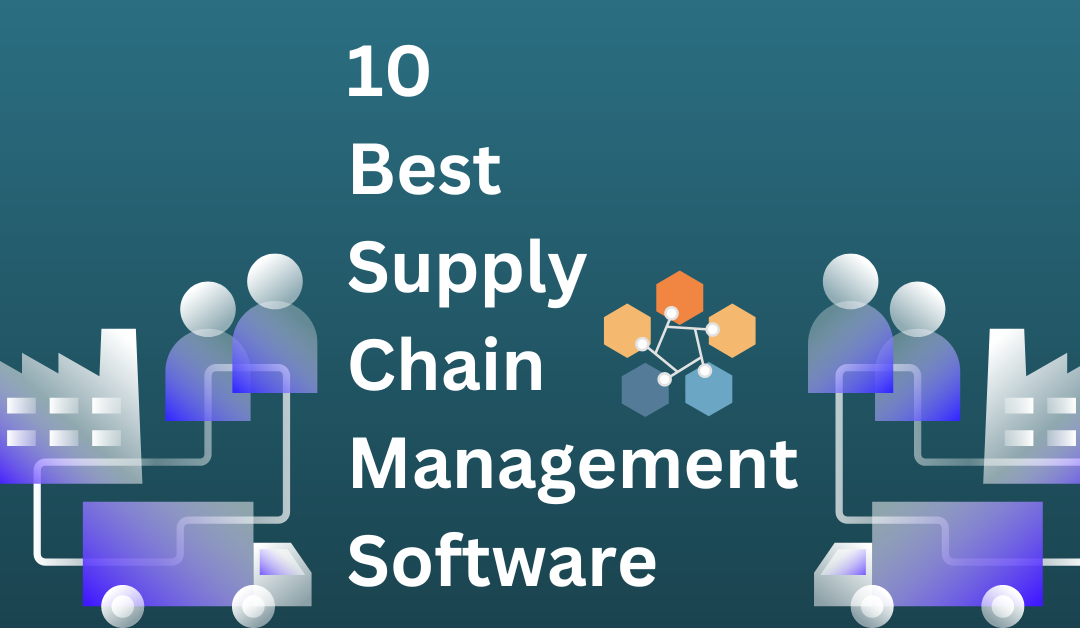Supply chain management software is a considerable approach to improving business growth and efficiency as it provides a platform that optimizes production, procurement, and transportation processes. In this article, you will know the top-tier supply chain management softwares according to their performance and key features.
Top 3 Gigs:
“SAP,” the first program on the list, sets itself apart from other systems of a similar kind by being appropriate for businesses of all sizes. Thanks to SAP’s advanced analytics, companies can analyze enormous volumes of data to find trends, patterns, and areas that could be optimized.
The second software on the list is called “Magaya Corporation” and has an intuitive user interface. This program addresses freight, logistics, and warehouse management challenges. More importantly, it provides deployment options and flexibility to companies in both on-premises and cloud contexts.
“NetSuite,” a single platform that combines supply chain management with other business operations, including e-commerce, finance, and customer relationship management, comes in third place on the top supply chain management software list.NetSuite has powerful analytics and reporting features. Because this program supports multiple currencies, languages, and countries, it is in high demand worldwide.
The company’s size, industry, needs, and unique supply chain difficulties should all be considered when choosing supply chain management software. Advanced analytics are provided by software such as SAP, Magaya Corporation, and NetSuite, which helps firms grow and optimize their supply chains.
List of best Supply Chain Management software:
Introducing supply chain management software, where optimizing your logistics, inventory, or operations has always been challenging. These software solutions provide an effortless and smooth way to streamline processes, enhance efficiency, and ensure seamless coordination across all the stakeholders. Here is the list of top supply chain management software offering distinctive features and functionalities to address diverse supply chain requirements.
List here:
- SAP offers comprehensive solutions for organizing and optimizing logistics, inventory, and operations within your supply chain.
- Magaya Corporation specializes in advanced supply chain management software, facilitating seamless logistics operations and enhancing efficiency.
- NetSuite provides scalable and cloud-based supply chain management solutions that empower businesses streamline streamline logistics and inventory control.
- FreightPOP, Inc. offers innovative transportation management that simplifies freight logistics and optimizes supply chain operations.
- Logiwa Technology, Inc. – It is a pioneer in cloud-based warehouses and provides inventory management software.
- Epicor – This software delivers industry-leading enterprise solutions, including comprehensive supply chain management tools for businesses worldwide.
- Oracle SCM – Oracle SCM Cloud offers state-of-the-art supply chain management solutions that let companies leverage cloud-based efficiency to streamline operations and spur growth.
- Coupa- It offers a comprehensive cloud-based procurement and supply chain management platform, helping businesses run more profitably and efficiently.
- E2open – This program makes real-time visibility and collaboration across foreign networks easier.
- Logility – With its innovative supply chain optimization software, Logility gives companies access to planning and predictive analytics tools for increased resilience and efficiency.
Reviews of best supply chain management software:
Businesses can benefit from several advantages offered by the best supply chain management software. With the help of these solutions, operations, logistics, and inventory can all be optimized, leading to higher output and more efficient procedures.
These software systems’ dependable performance is one of their main advantages. Demand forecasting, inventory optimization, and order management are just a few of the tools available to companies to help them make informed decisions and adjust to shifting market conditions.
Another significant benefit of these software systems is their user-friendly interfaces. Users of any expertise level may effectively manage their supply chain operations with intuitive navigation and transparent displays.
The most significant supply chain management software for companies also makes it possible to track and monitor supply chain activities in real-time. With this visibility into inventory levels, transportation routes, and production schedules, organizations may quickly detect bottlenecks and inefficiencies.
Furthermore:
Many supply chain management software programs offer sophisticated analytics and reporting features. Companies can utilize this to boost productivity, spot trends, and obtain insightful knowledge about how they operate.
These software programs are compatible with current company systems and can be tailored to fit specific corporate goals. Because of its adaptability, businesses can alter the application to suit their requirements and work processes.
Furthermore, several supply chain management software packages offer flexible and accessible cloud-based deployment options. Allowing companies to access their supply chain tools and data from anywhere at any time promotes continuity and flexibility.
The top supply chain management software suppliers also give ongoing technical support and frequent updates. Businesses that do this will always have access to the newest features and enhancements and fast support in case of any issues.
Using the best supply chain management software has several benefits overall. With features like solid functionality, intuitive interfaces, real-time visibility, and sophisticated analytics, these solutions assist companies in achieving operational excellence and better supply chain management. Purchasing the appropriate supply chain management software may benefit small and large businesses by boosting productivity, cutting expenses, and raising customer satisfaction.
SAP :

SAP’s supply chain management software is a flexible and potent tool for managing supply chain operations, offering numerous benefits to businesses and experts. Thanks to its well-received broad feature set and user-friendly design, this program has emerged as a top choice for fans of supply chain management. We’ll now talk about the advantages of SAP’s supply chain management software:
Multi-Source Data Integration:
With SAP, users may combine data from distributors, manufacturers, suppliers, and other sources along the supply chain to provide complete visibility and control.
High-Quality Output:
SAP’s supply chain management software guarantees that data, whether in reports, analytics, or projections, is accurate and dependable by supporting a broad range of data types.
Customizable Settings:
With SAP’s software, users may customize their supply chain management procedures by selecting parameters like inventory levels, lead times, and order quantities to satisfy specific business needs.
Advanced Analytics and Planning:
In addition to management operations, SAP’s supply chain management software offers robust analytics and planning capabilities that let users forecast demand, analyze trends, and optimize inventory levels for better efficiency and lower costs.
Real-Time Monitoring:
Real-time monitoring solutions enable users to track critical performance metrics and monitor supply chain activity in real time, which helps to promote proactive decision-making and timely interventions.
Scalable and Flexible:
The supply chain management software from SAP is made to grow alongside companies of all sizes and sectors of the economy. It is flexible and adaptable to meet changing demands.
Cross-Platform Compatibility:
SAP’s software provides smooth compatibility with all leading operating systems and devices, regardless of the device type used by users—desktop, mobile, or cloud.
Pros :
- Simple to use UI that is intuitive.
- Enhanced planning and analytics capabilities.
- Scalable solution appropriate for all sizes of businesses.
- Thorough integration of data across the supply chain.
Cons:
- It may be difficult for novices.
- Steep learning curve since characteristics are abundant.
- Certain hardware combinations or operating systems may cause compatibility problems.
Magaya corporation:

The supply chain management software from Magaya Corporation is a robust and adaptable instrument that organizations and professionals may use to optimize supply chain operations. Thanks to its extensive feature set and user-friendly interface, this program has been quite popular and is now seen as one of the best options for supply chain management enthusiasts. Let’s examine the advantages of the supply chain management software offered by Magaya Corporation:
Enhanced Collaboration:
Software from Magaya Corporation makes it easier for supply chain participants to collaborate, fostering smooth coordination and communication that boosts output and efficiency.
Compliance Management:
With built-in compliance features, Magaya Corporation’s software assists businesses in adhering to industry standards and regulatory laws, reducing the risk of non-compliance and associated penalties.
Cost Reduction:
Magaya Corporation’s software optimizes inventory levels, transportation routes, and warehouse operations to help firms cut costs related to excess inventory, inefficient processes, and unnecessary delays.
Supply Chain Resilience:
Magaya Corporation’s software assists firms in minimizing disruptions and preserving business continuity by proactively recognizing and reducing supply chain risks such as supplier disruptions or transportation delays.
Predictive Insights:
Using software from Magaya Corporation, which provides predictive insights into demand patterns, market trends, and supplier performance through advanced analytics and machine learning algorithms, businesses may anticipate challenges and opportunities in the future.
Continuous Improvement:
Magaya Corporation’s software supports continuous improvement projects by helping firms find areas for optimization and drive continuing process enhancements. Features such as performance tracking, benchmarking, and KPI monitoring are included in the product.
Pros :
- Comprehensive Reporting
- Integration with Third-Party Systems
- Scalable Architecture
- Mobile Accessibility
- Customer Support
Cons :
- It’s potentially tricky for novices.
- Steep learning curve since characteristics are abundant.
- Certain hardware combinations or operating systems may cause compatibility problems.
NetSuite:

With many benefits to organizations and professionals, NetSuite’s supply chain management software is a solid and adaptable instrument for optimization. This program is a good pick for supply chain management fans because of its extensive feature set and user-friendly design, leading to its worldwide appeal. Let’s examine the benefits of the supply chain management software offered by NetSuite.
Innovative Technology:
NetSuite consistently invests in cutting-edge technology and updates to give users access to the newest features and functionalities and help them remain ahead of industry trends and problems.
Advanced Analytics and Planning:
NetSuite’s Supply Chain Management Software provides robust analytics and planning features in addition to management functions, enabling customers to estimate demand, assess trends, and optimize inventory levels for increased effectiveness and cost savings.
Multi-Source Data Integration:
To provide complete visibility and control, NetSuite enables customers to combine data from various sources along the supply chain, such as distributors, manufacturers, and suppliers.
Real-Time Monitoring:
Users can track key performance indicators and keep an eye on supply chain activities in real-time with the help of real-time monitoring features. This allows for proactive decision-making and prompt interventions.
Enhanced Supply Chain Visibility:
Using NetSuite’s complete supply chain insight, businesses can track and monitor inventory levels, supplier performance, and order progress in real-time.
Efficient Resource Allocation:
NetSuite allows companies to utilize resources more profitably by streamlining production schedules, transportation routes, and inventory levels. This lowers costs and increases overall profitability.
Scalable Solution:
NetSuite’s supply chain management software is made to grow and expand with companies of all sizes and in all sectors with ease, all without sacrificing functionality or performance.
Pros:
- Supply chain actors can collaborate more successfully and productively with NetSuite by communicating and coordinating more efficiently.
- With features like order monitoring and real-time updates, NetSuite improves customer experience by providing transparency and responsiveness across the supply chain process.
- The adaptable architecture of NetSuite enables businesses to quickly adapt to changing market conditions and customer expectations, fostering competitiveness and agility.
- By following industry norms and regulations, businesses may reduce the risk of non-compliance and the fines accompanying it with NetSuite’s integrated compliance capabilities.
Cons:
- Implementing NetSuite’s supply chain management solution could be challenging and time-consuming, requiring careful planning and resources.
- Despite NetSuite’s customization options, businesses could find it challenging to tailor the software to their particular requirements, leading to costs or compromises.
- Disparities in NetSuite’s compatibility with other systems could make it challenging to integrate and synchronize data, especially when working with more specialist software or older systems.
FreightPOP, Inc. :

One of the top suppliers of cutting-edge supply chain management systems is FreightPOP, Inc. FreightPOP provides industry-leading software that maximizes transportation efficiency and simplifies logistics operations for companies of all sizes. FreightPOP offers features like simple routing and real-time visibility, which help businesses manage their supply chains more successfully and efficiently.
Enhanced Visibility:
FreightPOP software provides unparalleled insight into all aspects of the supply chain, including shipment tracking and inventory management. Companies can make more informed decisions and provide better customer service by gaining actionable insights into their business through real-time updates and detailed dashboards.
Simplified Collaboration:
The FreightPOP platform enables seamless communication between supply chain actors by connecting stakeholders across the logistics network. Companies can optimize their connections with suppliers, carriers, and customers, streamline workflows, and minimize errors by leveraging shared data and centralized communication channels.
Automation and Efficiency:
FreightPOP software improves operational efficiency and productivity by automating manual operations and repetitive tasks. Companies can save time and money by managing order fulfillment and transportation, freeing employees to focus on strategic, value-added activities.
Data-driven insights:
With advanced analytics and reporting capabilities, FreightPOP enables companies to realize the full potential of their data. Tailored reports, predictive analytics, and actionable insights allow companies to identify patterns, increase efficiency, and drive continuous improvements across the supply chain.
Improved reporting and analysis:
FreightPOP provides companies with advanced reporting and analytics tools to help them monitor key performance indicators (KPIs), identify opportunities for improvement, and better understand supply chain performance. These tools enable data-driven decision-making and continuous optimization.
Optimized Carrier Selection:
The FreightPOP platform features allow businesses to compare transportation costs, transit times, and service levels to determine which shipping options are the most cost-effective and reliable for their needs.
Pros :
- logistics management at affordable price visibility and traceability of shipments in real-time
- Optimized processes in the supply chain. Answer
- scalable, suitable for companies of all sizes
Cons :
- Implementation Complexity
- Possible integration difficulties with current systems
- learning curve for new users
Logiwa Technologies, Inc.
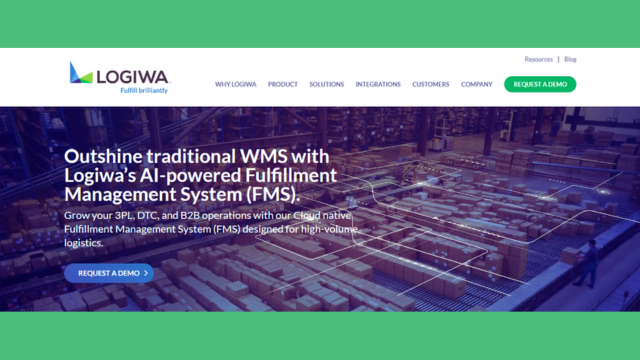
The leading supplier of state-of-the-art supply chain management software systems is Logiwa Technologies, Inc. The cutting-edge technology from Logiwa is intended to completely transform how companies handle their logistics operations by providing unmatched supply chain efficiency, visibility, and flexibility. The benefits of Logiwa’s supply chain management software will be discussed now:
Dynamic Order Routing:
By enabling companies to dynamically assign orders to the most effective fulfillment locations based on variables like inventory availability, shipping prices, and customer proximity, Logiwa’s platform optimizes order routing and fulfillment processes and lowers delivery times and costs.
Inventory Optimization:
Using advanced demand forecasting, replenishment planning, and inventory allocation algorithms with Logiwa, businesses can optimize inventory levels and lower carrying costs while ensuring the correct products are available when customers need them.
Multi-Channel Integration:
By allowing companies to handle orders, inventory, and shipments across many channels from a single centralized platform, Logiwa effortlessly interacts with various sales channels, marketplaces, and e-commerce platforms. This streamlines operations and increases order accuracy.
Automated Returns Management:
With the automation of workflows for return permission, inspection, and restocking, Logiwa’s software optimizes the returns management process, cutting expenses and processing times while raising customer satisfaction.
Supply Chain Collaboration:
Logiwa facilitates collaboration and communication among supply chain partners, enabling real-time sharing of data and information, collaboration on inventory planning and forecasting, and coordination of logistics activities, enhancing overall supply chain visibility and efficiency.
Optimized Warehouse Operations:
With advanced warehouse management capabilities like wave picking, labor management, and slotting optimization included in Logiwa’s software, organizations can increase overall operational performance, reduce labor expenses, and maximize warehouse efficiency.
Pros :
- Real-time monitoring and control of inventories
- Effective order fulfillment and processing
- Enhanced warehouse productivity
- scalable approach to company expansion
- Enhanced analytics and reporting to support well-informed decision-making
Cons :
- Possible intricacy during execution
- Difficulties in Integrating with Current Systems
- The learning curve for brand-new users
Epicor :
With its comprehensive supply chain management software solution, Epicor gives companies access to state-of-the-art resources to improve and expedite their operational and logistical procedures.
Streamlined Inventory Management:
With the help of Epicor’s software, organizations can effectively manage stock levels, lower carrying costs, and avoid stockouts by having real-time visibility into inventory levels, locations, and movements.
Efficient Order Processing:
Order processing workflows can be automated by organizations using Epicor, from order capture to fulfillment. This guarantees that orders are processed accurately and effectively, improving customer satisfaction and reducing turnaround times.
Integrated Supply Chain Planning:
With Epicor’s robust supply chain planning tools, companies can shorten lead times and better match supply and demand by forecasting demand, streamlining production scheduling, and optimizing procurement.
Enhanced Supplier Collaboration:
With tools like vendor portals and electronic data interchange (EDI), Epicor makes it easier for companies to work with suppliers. This helps them communicate more efficiently, expedite the procurement process, and negotiate better terms.
Advanced Reporting and Analytics
With the help of Epicor’s robust reporting and analytics capabilities, organizations can monitor key performance indicators (KPIs), pinpoint areas for improvement, and obtain meaningful insights into the operation of their supply chains. This promotes data-driven decision-making and ongoing optimization.
Pros :
- streamlined the sourcing and procurement procedures
- Improved cooperation and correspondence among suppliers
- enhanced inventory management and demand forecasting
- Effective management of logistics and transportation
- improved supply chain visibility and transparency
Cons:
- It could take some time for the first setup and setting.
- Integrating outdated systems might be complex at times.
- Users must receive training to utilize the possibilities of the software properly.
Oracle SCM:
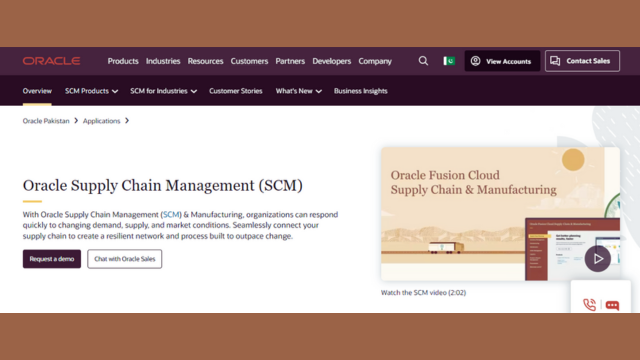
Oracle SCM Cloud is a state-of-the-art software program created to enhance business expansion and streamline supply chain management. Businesses can improve communication with suppliers and partners, optimize supply chain processes, and increase visibility using Oracle SCM Cloud’s intuitive interface and sophisticated features.
Enhanced Supply Chain Visibility:
Oracle SCM Cloud gives companies real-time visibility into supply chain operations to monitor shipments, track inventory levels, and spot possible bottlenecks. Making well-informed decisions and being more adaptable to changes in the market are made possible by this visibility.
Integrated Planning and Execution:
Oracle SCM Cloud integrates planning and execution processes, including demand forecasting, inventory optimization, and order fulfillment. This integration streamlines operations, reduces lead times, and improves overall efficiency.
Collaborative Supplier Management:
Oracle SCM Cloud uses capabilities like electronic data exchange (EDI) and supplier portals to make working with suppliers easier. Through this partnership, supplier connections are strengthened, procurement procedures are streamlined, and communication is improved.
Advanced Analytics and Insights:
Robust reporting and analytics features provided by Oracle SCM Cloud allow companies to obtain helpful information about the operation of their supply chains. These insights support ongoing improvement by assisting in identifying trends, precise demand forecasting, and well-informed decision-making.
Scalable and Flexible Solution:
Because Oracle SCM Cloud is adaptable and scalable, companies of various sizes can use it. It can easily interface with current systems, assist growth ambitions, and adapt to changing business demands.
Customer-Centric Order Management:
Oracle SCM Cloud provides client-centric order management features that let companies accurately fulfill customer requests, manage orders across channels, and deliver top-notch customer support.
Pros:
- simplified procedures for procurement
- Improved cooperation between suppliers
- increased precision in demand forecasting
- Effective management of transportation
- Enhanced transparency of the supply chain
Cons:
- setup and configuration taking a long time
- Challenges in integrating legacy systems
- It takes training to make the best use of
Coupa:

Coupa Supply Chain Management (SCM) software is a cloud-based solution for companies of all sizes that optimizes and streamlines supply chain operations. Its extensive toolkit for managing sourcing, inventory, supplier relationships, and procurement enables businesses to improve efficiency, cut costs, and foster collaboration throughout the supply chain.
Streamlined Procurement:
By automating procedures from purchase order preparation, approval, and fulfillment to requisition, Coupa SCM streamlines the procurement process. This increases procurement efficiency, decreases manual error, and streamlines purchasing processes.
Supplier Collaboration:
The program uses communication tools and supplier portals to enable easy collaboration with vendors. It facilitates collaboration on sourcing projects, real-time communication, and document sharing, strengthening bonds and raising supplier performance.
Demand Planning and Forecasting:
Utilizing data analytics and artificial intelligence (AI) to examine past trends, market dynamics, and demand signals, Coupa SCM provides sophisticated demand planning and forecasting capabilities. This makes it possible for businesses to optimize inventory levels, reduce stockouts, and accurately estimate demand.
Inventory Optimization:
Organizations may optimize inventory management, save carrying costs, and increase inventory turnover rates using Coupa SCM’s visibility into inventory levels, locations, and movements throughout the supply chain. It includes inventory tracking, stock level monitoring, and demand-driven replenishment.
Cost Savings:
Coupa SCM helps businesses save money by optimizing inventory levels, strengthening supplier relationships, and expediting procurement procedures. It makes it possible to negotiate with suppliers more effectively, cut down on maverick expenditure, and eliminate supply chain inefficiencies.
Pros :
- interface that is easy to use and intuitive
- strong sourcing and procurement skills
- sophisticated forecasting and planning of demand
- Tools for seamless supplier collaboration
- economical cloud-based option
Cons:
- Challenges in integrating legacy systems
- less choices for customization than with on-premises systems
- It could take time and resources for the initial setup and deployment.
E2Open :
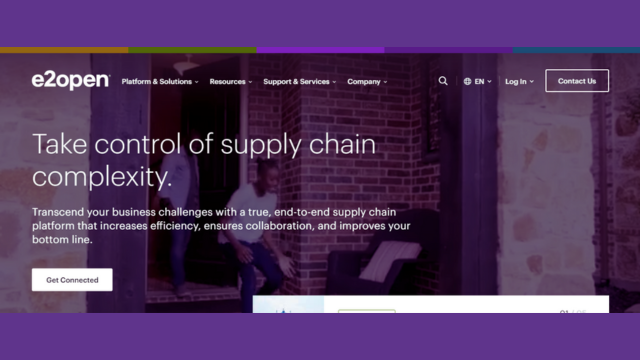
E2open is a top cloud-based supply chain management (SCM) software system designed to optimize and orchestrate intricate supply chain activities over worldwide networks. With its end-to-end visibility, collaboration, and analytics capabilities, businesses may increase operational effectiveness, reduce risk, and boost customer happiness.
End-to-End Visibility:
From the procurement of raw materials to the delivery of the finished product, E2open provides real-time visibility into every facet of the supply chain. Organizations can make proactive decisions and manage risks by using this visibility to analyze inventory levels, monitor production schedules, and spot possible bottlenecks or delays.
Supply Chain Collaboration:
The platform makes it easier for suppliers, logistics companies, and trading partners to collaborate and communicate with each other. It strengthens bonds and increases supply chain flexibility by facilitating safe data sharing, document interchange, and teamwork for planning, executing, and forecasting.
Demand Sensing and Forecasting:
E2open uses machine learning algorithms and advanced analytics to produce precise demand estimates to examine market trends, demand signals, and historical data. By doing this, businesses can minimize the costs of storing extra inventory while increasing customer service, decreasing stockouts, and optimizing inventory levels.
Optimized Inventory Management:
Organizations may optimize inventory levels, save carrying costs, and increase inventory turnover rates with the help of E2open’s inventory optimization solutions. Improved inventory planning and management are made possible by the insights it offers about lead times, supply chain risks, and demand variations.
Supply Chain Risk Management:
Supplier interruptions, unstable Political environments, and natural disasters are just a few of the supply chain risks E2open helps businesses proactively detect and reduce. It provides risk assessment tools, scenario modeling capabilities, and real-time notifications to facilitate prompt response and resilience in the face of unforeseen events.
Pros:
- complete supply chain visibility from beginning to finish
- Cutting-edge trading partner collaboration and communication tools
- Capabilities for accurately anticipating and detecting demand for precise demand planning
- Features for inventory optimization that lower carrying costs
- Tools for supply chain risk management to reduce interruptions
Cons:
- Exorbitant setup and subscription fees
- Due to the platform’s complexity, users may need to receive training.
- Challenges in integrating with current enterprise systems
Logility :
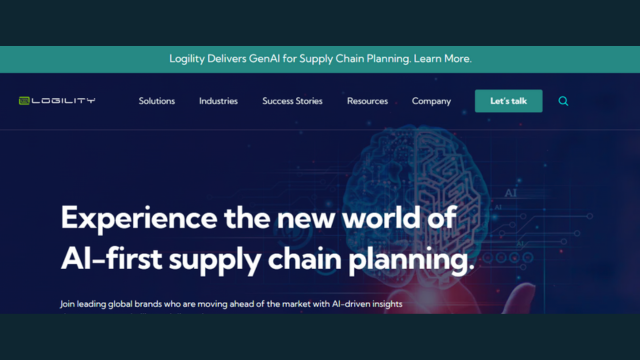
Leading supplier of supply chain management (SCM) software solutions, Logility assists businesses in improving visibility, streamlining processes, and spurring expansion. Businesses can increase supply chain communication, simplify inventory management, and improve forecasting accuracy using Logility’s complete toolkit and sophisticated analytics capabilities.
Demand Planning and Forecasting:
Logility’s robust demand planning and forecasting capabilities can produce precise demand projections using market trends, historical data, and predictive analytics. This aids businesses in minimizing stockouts, increasing customer satisfaction, and optimizing inventory levels.
Inventory Optimization:
Organizations may optimize inventory levels, save carrying costs, and increase inventory turnover rates with the help of Logility’s inventory optimization solutions. Through the analysis of lead times, supply chain restrictions, and demand unpredictability, Logility assists companies in striking the ideal balance between service levels and inventory investment.
Supply Chain Collaboration:
Traders, suppliers, and internal stakeholders can collaborate and communicate more easily when there is clarity. Real-time data sharing, scenario analysis, and decision-making are made possible by its collaborative planning tools, strengthening bonds and increasing supply chain agility.
Production Planning and Scheduling:
Organizations may improve production schedules, reduce lead times, and maximize resource usage with the help of Logility’s comprehensive production planning and scheduling capabilities. Through synchronizing production processes with inventory levels and demand forecasts, Logility assists organizations in lowering costs and increasing manufacturing efficiency.
Supply Chain Analytics:
With the help of Logility’s comprehensive analytics and reporting capabilities, businesses may obtain helpful information on the performance of their supply chains. With KPI tracking, predictive analytics, and configurable dashboards, Logility assists companies in finding areas for process optimization, spurring ongoing innovation, and identifying improvement opportunities.
Scenario Planning and Analysis:
Organizations can use scenario planning and analysis using Logility to assess different supply chain strategies and their possible effects on essential performance indicators. Users can evaluate the impact of various scenarios on inventory levels, costs, and customer service levels by simulating events like shifts in demand patterns, supply chain disruptions, or pricing tactics. Businesses may reduce risks, make well-informed decisions, and create robust backup plans to deal with unanticipated occurrences and changes in the market by carrying out thorough scenario analysis.
Pros:
- Enhanced capacity for demand forecasting and planning
- Tools for inventory optimization to improve inventory management efficiency
- Collaboration tools for accessible trading partner communication
- Capabilities for production scheduling and planning to maximize manufacturing operations
- Robust reporting and analytics capabilities for data-driven decision-making
Cons:
- Exorbitant setup and subscription fees
- Due to the platform’s complexity, users may need to receive training.
- Challenges in integrating with current enterprise systems
Buying Guide for Best Supply Chain Management Software:
Competitive advantage and operational optimization in today’s ever-changing business environment depend heavily on the effectiveness of supply chain management software. Choosing the appropriate software might take much work with many available options. We’ve put up this thorough buying guide, which covers essential things to consider before spending money on supply chain management software to help you make an informed choice.
Understand Your Business Needs:
Examine your unique supply chain needs, such as inventory control, demand forecasting, order fulfillment, and logistics optimization, before looking at possibilities. Consider your company’s size, industry standards, and growth forecasts.
Functionality and Features:
Seek for software with an extensive feature set catered to your company’s requirements. Inventory tracking, order management, supplier cooperation, demand forecasting, transportation management, and analytics capabilities for data-driven insights are essential features to consider.
Ease of Integration:
To enable efficient data interchange and workflow automation, achieve a smooth integration between the program and your current systems, including accounting software, CRM, and ERP. Enhancing functionality and scalability requires compatibility with third-party programs and APIs.
Scalability and Flexibility:
Select a system that can grow with your company and adjust to changing market needs. The software must provide adaptable setups and customization choices to suit evolving corporate needs and industry developments.
User Experience and Training:
To maximize software adoption, prioritize user-friendly software with an easy-to-use interface and plenty of training materials to help users get started quickly. Seek suppliers who give thorough training courses, user manuals, and continuous assistance to guarantee that the software’s features are fully utilized.
Security and Compliance:
A key component of supply chain management is data security. To protect sensitive data, use software that complies with industry standards and laws, such as GDPR and ISO certifications. Consider security measures like audit trails, access controls, and encryption to reduce cybersecurity threats.
Total Cost of Ownership:
Take into account the overall cost of ownership, which includes license fees up front, implementation expenses, continuing maintenance charges, and support fees. Select a system that gives value for money regarding features, functionality, and possible return on investment, along with transparent pricing models.
Vendor Reputation and Support:
Examine the vendor’s standing in the market, background in the field, and history of completed projects successfully. To quickly handle your needs, pick a trustworthy supplier with a track record of providing creative, dependable solutions and attentive customer care.
User Reviews and Testimonials:
Use case studies, internet reviews, and testimonials to get input from industry colleagues and current users. Experiences in the real world might offer insightful information on the software’s functionality, dependability, and applicability to your needs.
Future-Proofing:
To future-proof your investment, choose software that can adjust to cutting-edge technology and market trends like blockchain, AI, machine learning, and the Internet of Things. Assess the vendor’s dedication to new product development and its roadmap for upcoming upgrades and improvements.
Tips for making the right choice :
- Examine the demos or trial versions of several supply chain management software programs.
- Evaluate the user interface, functionality, and fit for your company’s requirements.
- Think about scalability and the capacity to handle expansion and modifications in the future.
- Evaluate compliance with regulations and ability to adjust to changing industry trends.
- Select a system that will grow with your company to optimize ROI over time. Give priority to the features and functionality you want instead of just considering the price.
- Determine the essential skills needed to solve specific supply chain problems.
- To improve operations and spur business success, choose a software solution that aligns with strategic goals.
Now that you have a solid understanding of the factors to consider before buying the best supply chain management software.
Purchasing the appropriate supply chain management software is crucial for increasing productivity, cutting expenses, and promoting corporate expansion. You can make an informed decision that supports your company goals and puts you in a competitive position today by considering aspects like functionality, integration capabilities, scalability, user experience, security, cost, vendor reputation, and future-proofing.
FAQs about the best supply chain management software:
What is supply chain management software, and why is it essential for businesses?
Using supply chain management software, businesses can more effectively and efficiently control the movement of goods and services, from raw materials to final products. It improves operational performance and customer satisfaction by streamlining production, distribution, transportation, inventory management, and procurement procedures.
What features should I look for in supply chain management software?
Demand forecasting, inventory optimization, order management, supplier cooperation, transportation management, warehouse management, and analytics are some characteristics to look for. Meeting particular business demands requires scalability, integration capabilities, and customizable settings.
Which industries benefit the most from supply chain management software?
Several industries benefit from supply chain management software, including retail, manufacturing, distribution, logistics, healthcare, and food and beverage. Software solutions help any industry with complicated supply chain procedures run more smoothly and efficiently.
Is using supply chain management software for managing procurement and sourcing processes legal?
Yes, using supply chain management software for managing procurement and sourcing processes is legal and encouraged. However, it’s essential to comply with relevant regulations and ethical standards, such as fair procurement practices and data privacy laws.
Can supply chain management software integrate with existing systems like ERP and CRM?
Many supply chain management software packages provide easy connectivity with pre-existing corporate programs such as CRM, ERP, and other enterprise resource planning systems. Integration increases overall operating efficiency and guarantees data consistency.
Are there free supply chain management software options available?
Although open-source and free supply chain management software options are available, their functionality and support may be more limited than those of premium solutions. Examining your budget and business needs is crucial when deciding between free and premium software.
How do I successfully implement and adopt supply chain management software within my organization?
Careful planning, stakeholder involvement, training, and continuous support are necessary to deploy and use supply chain management software successfully. To guarantee successful adoption, pick a software provider with a track record of success, give users thorough training, and monitor and assess performance regularly.
What are the key benefits of using supply chain management software for businesses?
Supply chain management software has numerous advantages, such as better inventory control, more visibility and transparency, streamlined sourcing and procurement procedures, lower operating expenses, and higher customer satisfaction. Better decision-making is also made possible by real-time data analytics and insights.
How do you choose the suitable supply chain management software for your needs?
It’s essential to consider aspects like features, industry-specific requirements, integration capabilities, and vendor reputation when selecting your company’s best supply chain management software. You may make an educated choice that promotes efficiency and expansion in your supply chain operations by answering often-asked inquiries and comprehending your company’s requirements.
Final Thoughts:
In conclusion, companies looking to improve efficiency, simplify processes, and maintain their competitiveness in the ever-changing business landscape must choose the best supply chain management software. With so many options at your disposal, ranking them according to your unique business goals and needs is critical.
You may identify a supply chain management solution that fits your needs by carefully weighing aspects like functionality, scalability, integration capabilities, and user-friendliness. Always remember that the finest solution for one business might not be the perfect fit for another, so it’s critical to customize your choice to your particular needs and objectives.
Staying current on the most recent developments and trends in supply chain management technologies is also essential. New features and innovations are always being added to meet new opportunities and difficulties as the industry develops. By regularly reviewing your software selection, you can make sure that you always have the best tools available to promote operational excellence and commercial expansion.
- For companies of all sizes, SAP provides complete supply chain management solutions.
- Magaya Corporation’s Supply Chain Management’s cutting-edge features simplify sourcing and procurement procedures.
- NetSuite offers collaboration and end-to-end supply chain insight.
Spending money on the best supply chain management software is an investment in your company’s long-term viability and durability. Using the right solution may reduce risks, improve visibility, streamline operations, and provide outstanding value to your stakeholders and clients. So, take the time to research, evaluate, and choose wisely – your supply chain transformation journey begins now, and the possibilities are endless!
Next Article: BEST ZOOM Alternatives Software

